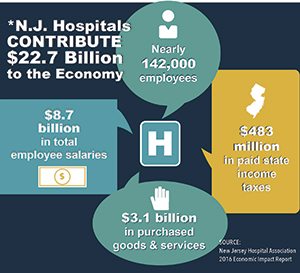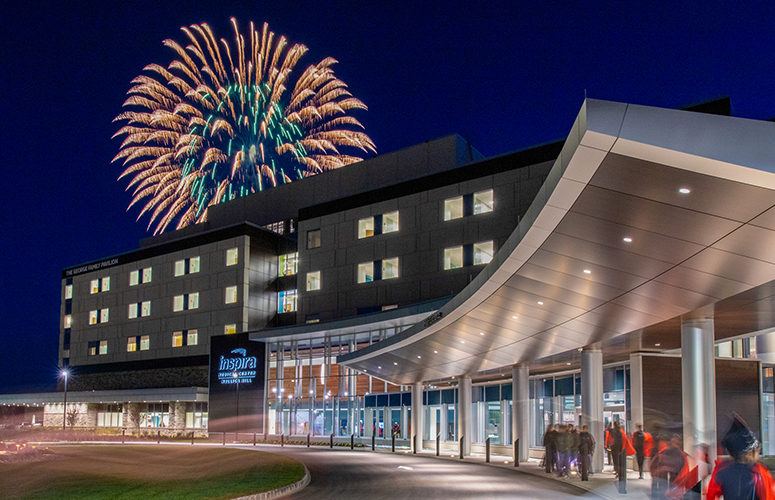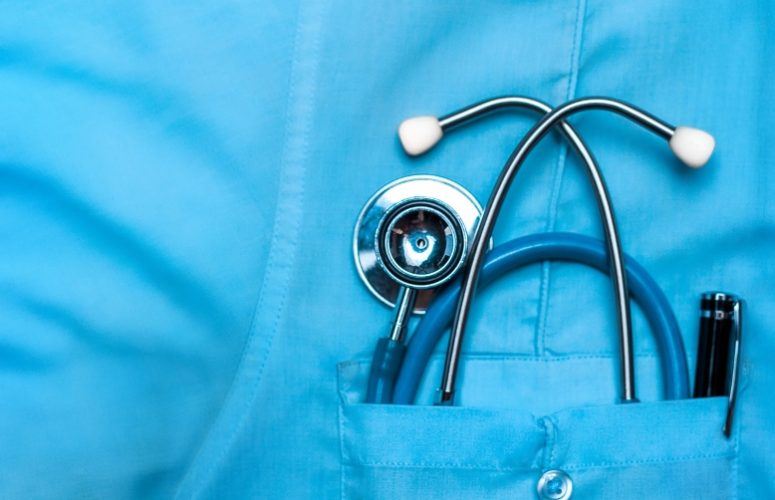
Healthcare Providers Form Bedrock of NJ Economy
By Melinda Caliendo On Mar 29, 2017Jobs, salaries, employee income taxes and support of other New Jersey businesses – not to mention delivering healthcare services 24/7/365. That’s the economic impact of New Jersey’s hospitals, health systems, nursing homes and home health providers.
Hospitals and Health Systems
New Jersey hospitals and health systems contributed $22.7 billion to the Garden State economy in 2015, according to the 2016 “NJ Hospitals Economic Impact Report” from the New Jersey Hospital Association (NJHA). That total includes:
- 142,000 jobs, which produce $8.7 billion in employee payroll spending and $483 million in estimated state income tax paid by employees.
- $153 million in statewide taxes paid, including a 0.53 percent assessment on total operating revenues, which generates $126 million annually; a $10 assessment on hospital admissions, which yields another $17.6 million for the state; and newborn screening fees that total $9.7 million annually. These state assessments do not include local property taxes paid by for-profit hospitals or property taxes that nonprofit hospitals pay on their taxable properties.
- $3.1 billion in goods and services purchased from other companies, an increase of $200 million over 2014. Key areas include contracted labor ($1.5 billion), pharmaceuticals ($1.2 billion), dietary, laundry and housekeeping ($136 million) and building supplies ($23 million).
- More than $475 million in free and discounted care to the uninsured and those in need, which provides an important safety net for the state.
“New Jersey’s hospitals and health systems have consistently contributed jobs, fees, community services and purchasing power across our state,” says NJHA President and CEO Betsy Ryan. “We are proud to be a bedrock of the state and local economy.”
The Economic Impact Report uses data gathered from 71 acute care hospitals in the Garden State. The 2016 report, available online at www.njha.com/econimpact2016, also breaks out economic contributions at the county level and for individual hospitals.
“This report details the specific economic contributions of hospitals across our state, but there’s also a very important ripple effect of hospital and health system expenditures,” says Sean Hopkins, NJHA’s senior vice president of federal relations and health economics.
Nursing Homes

These skilled nursing facilities employ 55,395 full-time-equivalent employees, with total payroll of nearly $2.2 billion.
Those findings, from NJHA’s “New Jersey Nursing Home Profile,” are based on financial information from 2015 Medicare cost reports and quality information from the Centers for Medicare and Medicaid Services’ Nursing Home Compare website.
Nearly 60 percent of New Jersey’s 358 skilled nursing facilities received a four- or five-star rating for quality from the Centers for Medicare and Medicaid Services, compared with 46.3 percent nationally. That’s an increase from last year, when roughly half received high marks. New Jersey also has a much smaller proportion of low-rated facilities, with only 6.6 percent receiving a one-star rating compared to 16.4 percent nationally.
New Jersey’s nursing facilities increased the number of beds available to patients from 54,785 to 55,326, but average length-of-stay and average daily census have decreased since last year’s initial report, from 110 to 106 days and 47,034 to 46,900, respectively, indicating that patients are getting treated more efficiently and returning home more quickly. This is happening despite an increase in the percentage of patients whose stays are categorized as requiring an intensive level of rehabilitation and complex clinical care – from 80 percent to 85 percent.
The report also shows that more than half of New Jersey’s nursing home residents are Medicaid beneficiaries, which underscores the important role nursing homes play in caring for those who are economically disadvantaged.
Medicaid also pays nursing home providers at a rate that is 17 percent less than the actual cost of care, resulting in a $350 million annual Medicaid reimbursement shortfall for the state’s nursing homes.
“New Jersey’s nursing homes are maintaining a very high level of quality, jobs growth and improved efficiency, even as the dynamics surrounding nursing homes are changing dramatically,” says Theresa Edelstein, vice president of post acute care policy and special initiatives for NJHA.
Home Health
Extending the continuum of healthcare services – and the economic impact – are New Jersey’s home health agencies, which add more than $552 million to the state’s economy, according to NJHA’s “New Jersey Medicare Certified Home Health Agency Profile.” That total includes more than 4,500 full-time-equivalent positions including nurses, home health aides, therapists and social workers. Those full-time positions generate total income of $341.5 million, which yields more than $18.8 million in state income taxes.
NJHA’s Profile uses data from Medicare cost reports, which measures full-time equivalent jobs. However, home health agencies employ high numbers of part-time and per-diem employees, and the actual number of employed individuals is much higher. The Bureau of Labor Statistics, for example, cites a total of 35,250 home health aides employed in New Jersey.
New Jersey’s home health professionals helped care for 361,098 individuals in 2015 and delivered more than 653,000 hours of home health aide care.
Related Articles:






